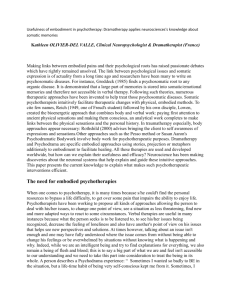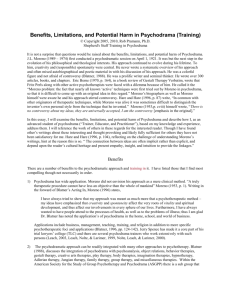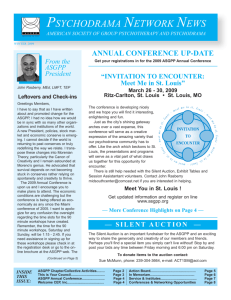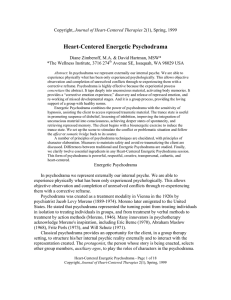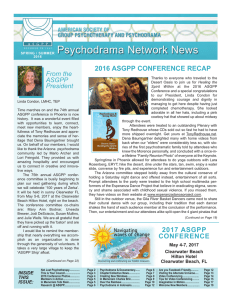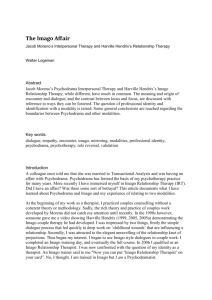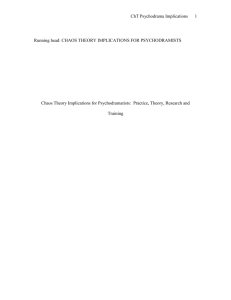File Now
advertisement
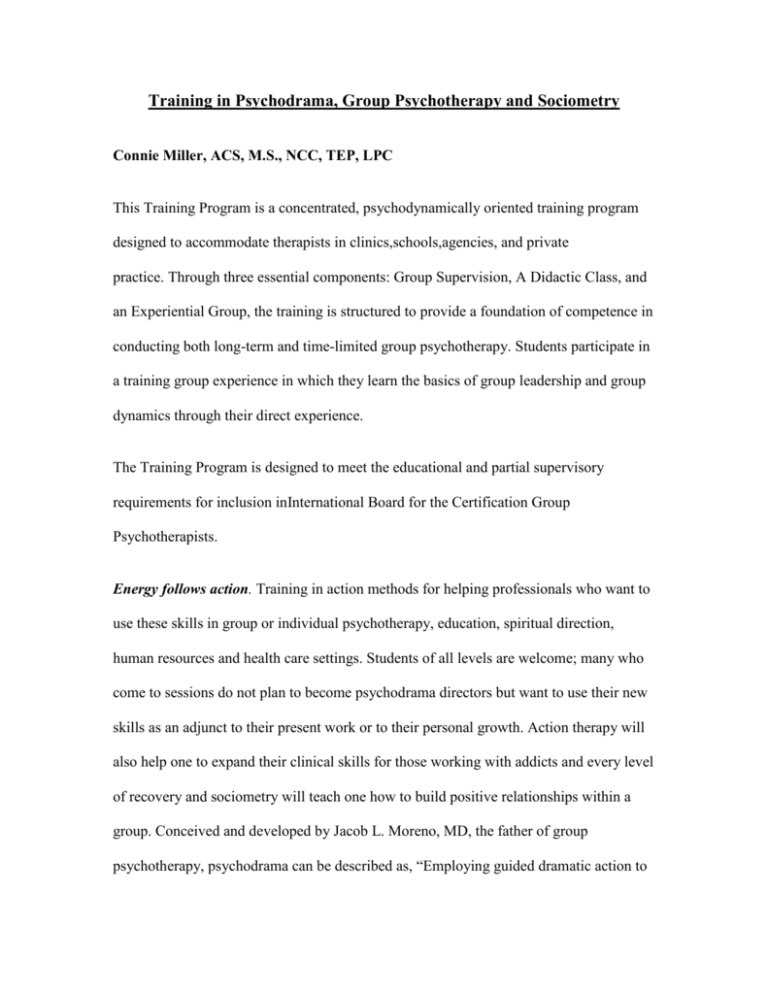
Training in Psychodrama, Group Psychotherapy and Sociometry Connie Miller, ACS, M.S., NCC, TEP, LPC This Training Program is a concentrated, psychodynamically oriented training program designed to accommodate therapists in clinics,schools,agencies, and private practice. Through three essential components: Group Supervision, A Didactic Class, and an Experiential Group, the training is structured to provide a foundation of competence in conducting both long-term and time-limited group psychotherapy. Students participate in a training group experience in which they learn the basics of group leadership and group dynamics through their direct experience. The Training Program is designed to meet the educational and partial supervisory requirements for inclusion inInternational Board for the Certification Group Psychotherapists. Energy follows action. Training in action methods for helping professionals who want to use these skills in group or individual psychotherapy, education, spiritual direction, human resources and health care settings. Students of all levels are welcome; many who come to sessions do not plan to become psychodrama directors but want to use their new skills as an adjunct to their present work or to their personal growth. Action therapy will also help one to expand their clinical skills for those working with addicts and every level of recovery and sociometry will teach one how to build positive relationships within a group. Conceived and developed by Jacob L. Moreno, MD, the father of group psychotherapy, psychodrama can be described as, “Employing guided dramatic action to examine problems or issues raised by an individual (psychodrama) or a group (“sociodrama”). Using experiential methods, sociometry, role theory, and group dynamics, psychodrama facilitates insight, personal growth, and integration on cognitive, affective, and behavioral levels. It clarifies issues, increases physical and emotional well being, enhances learning and develops new skills.” On the benefits of this experiential form of therapy, “Action methods used in psychodrama offer exciting and effective ways to expand and enliven communication, learning, self-discovery and skill building in groups with those in recovery from substance abuse.” When action is added to the learning process, it: Dissolves passivity Shows a person's inner world and experiences as an alternate way of disclosure Gives greater energy to a person's words Helps clarify thoughts and feelings Increases spontaneity and creativity, allowing a person to look at life with more options Purpose: If you are looking to develop or enhance your skills as a group psychotherapist, an on-going professional training group exists in Monmouth County, New Jersey. Participants to earn certification credit in group psychotherapy and psychodrama, and continuing education credit for certified group psychotherapists (CGPs). Continuing education credits for various professions are also possible. Content: The training is both experiential and didactic. Each session will include processing of interpersonal interactions within the group as well as a discussion of techniques and theory applied. The academic portion of the training involves an extensive reading list which in part covers the fields of group dynamics, the history of group therapy, sociometry, psychodrama, sociodrama, action techniques, adjunctive techniques, therapeutic factors, process and outcome research, ethics, various theoretical orientations to group therapy as well as other related topics. Each training session includes a significant portion of the time to processing and analyzing the group. This may include demonstration, lecture, videotape feedback, or a question and answer format. The candidate becomes an active member in the training group as a way of engaging in self study for professional and personal growth. Continuing Education. Participants in training sessions may earn certification credit in group psychotherapy and psychodrama, and continuing education credit for certified group psychotherapists (CGPs) and Nationally Certified Counselors. Continuing education credits for various professions (psychologists, social workers, nationally certified counselors, rehabilitation counselors, nurses, certified drug and alcohol counselors and other mental health professionals) are also available. 1. Group process supervision will involve members raising issues on facilitation of group process on topics such as: -Forming groups -Confidentiality -Altering the groups' dynamic -Understanding and using sociometry -Using action methods -Practical concerns and safety issues -Helping isolates -Intervention Techniques -Countertransference issues -Financial matters -Terminating a group -Interacting with other professionals -Learning to process the group from different perspectives This seminar integrates the principles and applications of psychodynamic group psychotherapy. Course content includes: private practice/agency issues, patient selection, composition, pre-group preparation, transference and countertransference, the group leader, theoretical perspectives, therapeutic techniques, group process, group dynamics, and termination. PSYCHODRAMA: The basic elements (operational components) of psychodrama are: The protagonist: Person(s) selected to "represent theme" of group in the drama. The auxiliary egos: Group members who assume the roles of significant others in the drama The audience: Group members who witness the drama and represent the world at large. The stage: The physical space in which the drama is conducted The director: The trained psychodramatist who guides participants through each phase of the session. . Psychodrama affords participants a safe, supportive environment in which to practice new and more effective roles and behaviors. SOCIOMETRY: J. L. Moreno investigated the structure of groups and society and developed Sociometry-the scientific measurement of social relationships in groups. As in systems models, the individual is viewed in relationship to others. Sociometry in its most basic sense can be best characterized as a collection of methods to investigate and evaluate networks of existing and preferred relationships. Specifically, sociometry is the study of interpersonal choices regarding criteria of interest to the investigator. Sociometry is not a study of formal group structure (e.g., official hierarchies); rather it is a phenomenological study of people's interpersonal choices (Treadwell & Kumar, 1985, 1997). Sociometric explorations measure, observe, and intervene in the natural attraction/rejection processes within a given group, e.g., family, social, work, community. These explorations may be didactic or action oriented and include social atoms, role diagrams, interpersonal relations, sociograms, and social networks. The goals of Sociometry include: Facilitate constructive change in individuals and groups. Increase awareness, empathy, reciprocity and social interactions. Explore social choice patterns and reduce conflicts. Clarify roles, interpersonal relations, and values. Reveal overt and covert group dynamics. Increase group cohesion and productivity.
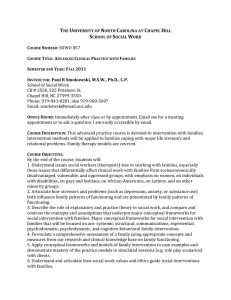

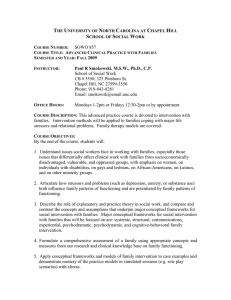
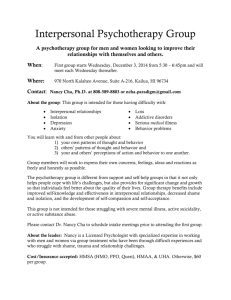
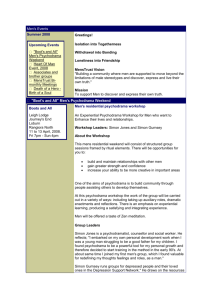
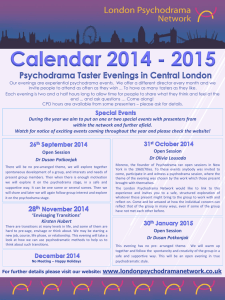
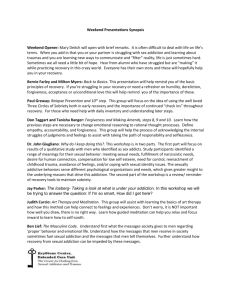
![UW2 - Psychiatric Treatments [2014]](http://s3.studylib.net/store/data/006859622_1-db6167287f6c6867e59a56494e37a7e7-300x300.png)
